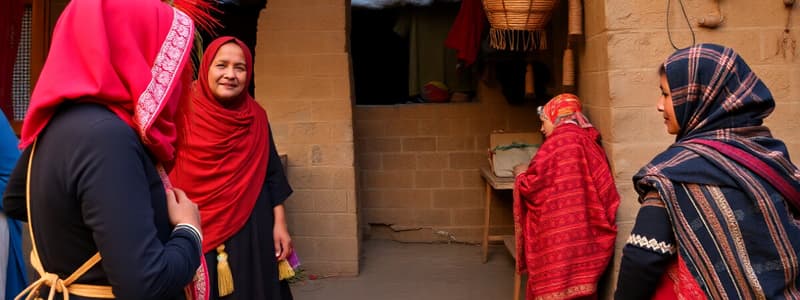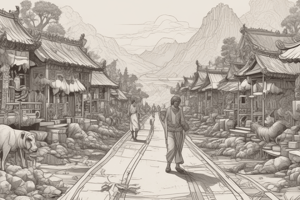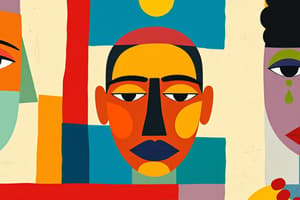Podcast
Questions and Answers
Which of the following best describes the relationship between a state and its government?
Which of the following best describes the relationship between a state and its government?
- The state is a temporary body that administers the government.
- The state and government are interchangeable terms referring to the same entity.
- The government is the personnel that manages the affairs of the state. (correct)
- The government establishes the territory of the state.
A country's government unexpectedly opens trade routes after an existing conflict with a differing country to help its economy. Which element is being exercised?
A country's government unexpectedly opens trade routes after an existing conflict with a differing country to help its economy. Which element is being exercised?
- Nationality
- Environment
- Territory
- Sovereignty (correct)
How do mores differ from folkways in shaping social behavior?
How do mores differ from folkways in shaping social behavior?
- Mores are less important than folkways in maintaining social order.
- Mores are habitual, while folkways are based on morality.
- Mores are repetitive behaviors, while folkways are ethical standards.
- Mores distinguish right from wrong, while folkways are conventional habits. (correct)
A society is debating whether to implement a new policy that could significantly impact the economy. According to the content, what broader factor will most influence whether the electorate accepts or rejects this policy?
A society is debating whether to implement a new policy that could significantly impact the economy. According to the content, what broader factor will most influence whether the electorate accepts or rejects this policy?
Which of the following scenarios best illustrates the concept of nationality as defined?
Which of the following scenarios best illustrates the concept of nationality as defined?
Which discipline primarily investigates human adaptation to the environment through the analysis of material remains from past populations?
Which discipline primarily investigates human adaptation to the environment through the analysis of material remains from past populations?
A researcher aims to understand the cultural significance of a religious ritual in a remote village. Which anthropological approach would be most suitable for this study?
A researcher aims to understand the cultural significance of a religious ritual in a remote village. Which anthropological approach would be most suitable for this study?
A scientist is researching the genetic variations among different human populations to understand their evolutionary history and adaptation to different environments. Which field of anthropology is this scientist working in?
A scientist is researching the genetic variations among different human populations to understand their evolutionary history and adaptation to different environments. Which field of anthropology is this scientist working in?
A community is facing challenges related to public health and sanitation. An anthropologist is brought in to apply anthropological theories and methods to address these issues and improve the community's well-being. Which branch of anthropology is being utilized?
A community is facing challenges related to public health and sanitation. An anthropologist is brought in to apply anthropological theories and methods to address these issues and improve the community's well-being. Which branch of anthropology is being utilized?
Which of the following best describes the 'scientific' approach in the context of studying society?
Which of the following best describes the 'scientific' approach in the context of studying society?
A researcher is studying the impact of social media on political polarization. They aim to collect quantifiable data and draw objective conclusions about this relationship. Which orientation are they most likely adopting?
A researcher is studying the impact of social media on political polarization. They aim to collect quantifiable data and draw objective conclusions about this relationship. Which orientation are they most likely adopting?
A political scientist is analyzing the historical and philosophical underpinnings of democracy, focusing on concepts such as human rights, justice, and equality. Which subfield of political science is this scholar primarily engaged in?
A political scientist is analyzing the historical and philosophical underpinnings of democracy, focusing on concepts such as human rights, justice, and equality. Which subfield of political science is this scholar primarily engaged in?
Researchers are investigating the factors that influence voter turnout in different countries, examining the role of campaign strategies, media influence, and socioeconomic status. Which area of study are these researchers contributing to?
Researchers are investigating the factors that influence voter turnout in different countries, examining the role of campaign strategies, media influence, and socioeconomic status. Which area of study are these researchers contributing to?
Which scenario exemplifies the concept of naturalization?
Which scenario exemplifies the concept of naturalization?
How do ethnic groups differ from the mainstream culture in a nation?
How do ethnic groups differ from the mainstream culture in a nation?
A person identifies as transgender. What does this indicate about their identity?
A person identifies as transgender. What does this indicate about their identity?
What distinguishes a transsexual individual from other gender identities?
What distinguishes a transsexual individual from other gender identities?
How does 'political identity' manifest in an individual's life?
How does 'political identity' manifest in an individual's life?
Which of the following most accurately describes 'cultural variation'?
Which of the following most accurately describes 'cultural variation'?
What is the core belief of a person who exhibits ethnocentrism?
What is the core belief of a person who exhibits ethnocentrism?
If a country uses an eagle as its national emblem, what role does the eagle serve?
If a country uses an eagle as its national emblem, what role does the eagle serve?
Flashcards
Environment (Political)
Environment (Political)
Historical, social, and economic conditions affecting policy acceptance.
State
State
A political entity with territory, government, people, and sovereignty.
Sovereignty
Sovereignty
Capacity of a political system to enforce rules within its territory.
Society
Society
Signup and view all the flashcards
Nationality
Nationality
Signup and view all the flashcards
Anthropology
Anthropology
Signup and view all the flashcards
Archaeology
Archaeology
Signup and view all the flashcards
Cultural Anthropology
Cultural Anthropology
Signup and view all the flashcards
Physical Anthropology
Physical Anthropology
Signup and view all the flashcards
Applied Anthropology
Applied Anthropology
Signup and view all the flashcards
Sociology
Sociology
Signup and view all the flashcards
Positive Orientation (Sociology)
Positive Orientation (Sociology)
Signup and view all the flashcards
Anti-Positivist Orientation
Anti-Positivist Orientation
Signup and view all the flashcards
Naturalization
Naturalization
Signup and view all the flashcards
Ethnic groups
Ethnic groups
Signup and view all the flashcards
Gender
Gender
Signup and view all the flashcards
Heterosexual
Heterosexual
Signup and view all the flashcards
Homosexual
Homosexual
Signup and view all the flashcards
Bisexual
Bisexual
Signup and view all the flashcards
Political identity
Political identity
Signup and view all the flashcards
Cultural variation
Cultural variation
Signup and view all the flashcards
Study Notes
- Anthropology studies mankind, their works, bodies, behavior, and values across time and space.
- Archaeology studies ancient and historical human remains to comprehend human adaptation and development.
- Cultural anthropology investigates a society's culture through its belief systems, practices, and possessions.
- Physical anthropology explores the biological development and contemporary variations of humans.
- Applied anthropology uses theories and approaches to solve modern-day issues.
- Sociology is defined as the scientific study of society including relationships, social interaction, and culture.
- Scientific, in the sociological context, pertains to methodological and theoretical rigor.
- Sociology applies its scientific methods to study society and human behavior.
- Society arises from human interactions, where individuals adhere to cultural rules.
- Positive orientation views society as quantifiable, allowing for objective deductions.
- Anti-positivist orientation uses a subjective approach to interpret social phenomena through individual experiences.
- Political theory examines the contemporary application of concepts like human rights, equality, peace, and justice.
- Comparative politics aims to contextualize differences in governmental and political systems.
- International relations studies state relations and the broader effects of globalization and climate, including terrorism and piracy.
- Political behavior encompasses individual attitudes, knowledge, and actions related to political factors, such as government policies.
- Public policy concerns the types of governmental policies and their underlying motivations for implementation.
- Public administration studies administrative schemes executed by government officials.
- Applied orientation addresses contemporary issues in politics, ethics, and governance across all subdisciplines.
- Environment consists of the historical, social, and economic conditions affecting the acceptability of policies.
- State is a political entity composed of territory, government, people, and sovereignty.
- Government is the personnel managing state affairs, particularly allocating scarce resources.
- Sovereignty is the capacity of a political system to enforce its rules and policies.
- Territory is defined by geographic space, including land, rivers, airspace, seas, seabed, and submarine areas.
Module 2
- Society is a group sharing a common culture within a specific geographic boundary.
- Material cultures consist of tangible objects.
- Non-material culture includes ideas, language, symbols, religion, behavior, gestures, and habits.
- Knowledge is information received and considered true.
- Beliefs are perceptions of accepted reality.
- Social norms are established expectations for behavior based on the context of time, place, or situation.
- Folkways are patterns of repetitive behavior that become habitual.
- Mores are ethical standards and moral obligations that distinguish right from wrong.
- Values are principles considered worthy, important, desirable, or valuable.
Module 3
- Nationality is the identity tied to being part of a country, sharing history, traditions, and language, within a defined territory.
- Naturalization is the process of acquiring nationality through birth or legal application.
- Ethnic groups are cultural groups within a nation sharing environments, traditions, and histories, not always part of the mainstream.
- Gender refers to socially constructed roles, behaviors, and attributes deemed appropriate for men and women.
- Sex refers to biological characteristics; gender categories are more diverse, including LGBTQI identities.
- Heterosexual: attracted to the opposite sex.
- Homosexual: attracted to the same sex.
- Gay: a male attracted to another male.
- Lesbian: a female attracted to another female.
- Bisexual: attracted to both sexes.
- Asexual: not sexually attracted to any sex.
- Polysexual: attracted to multiple genders.
- Pansexual: attracted to all types of gender.
- Transgender: gender identity does not match biological sex.
- Transsexual: sexual orientation is not related to genitalia, identifying as heterosexual, homosexual, pansexual, etc.
- Political Identity: attitudes and practices related to political systems.
- Cultural variation: differences in social behaviors across cultures.
- Ethnocentrism: promoting one's own culture as most efficient and superior.
- Symbol: object, word, or action representing something else culturally.
- Language: a form of symbolism.
Studying That Suits You
Use AI to generate personalized quizzes and flashcards to suit your learning preferences.




